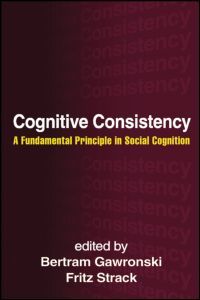Cognitive Consistency A Fundamental Principle in Social Cognition
Coordonnateurs : Gawronski Bertram, Strack Fritz

This volume provides an overview of recent research on the nature, causes, and consequences of cognitive consistency. In 21 chapters, leading scholars address the pivotal role of consistency principles at various levels of social information processing, ranging from micro-level to macro-level processes. The book's scope encompasses mental representation, processing fluency and motivational fit, implicit social cognition, thinking and reasoning, decision making and choice, and interpersonal processes. Key findings, emerging themes, and current directions in the field are explored, and important questions for future research identified.
1. Cognitive Consistency as a Basic Principle of Social Information Processing, Bertram Gawronski and Fritz Strack I. Mental Representation2. Cognitive Conflict and Consciousness, Ezequiel Morsella, Pareezad Zarolia, and Adam Gazzaley 3. A Neuroscientific Perspective on Dissonance, Guided by the Action-Based Model, Eddie Harmon-Jones, Cindy Harmon-Jones, and David M. Amodio4. Parallel Constraint Satisfaction as a Mechanism for Cognitive Consistency, Stephen J. Read and Dan Simon II. Fluency and Fit 5. Fluency of Consistency: When Thoughts Fit Nicely and Flow Smoothly, Piotr Winkielman, David E. Huber, Liam Kavanagh, and Norbert Schwarz6. Nonpropositional Consistency, Sascha Topolinski 7. Motivational Fit, E. Tory HigginsIII. Implicit Social Cognition8. Balanced Identity Theory:Review of Evidence for Implicit Consistency in Social Cognition, Dario Cvencek, Anthony G. Greenwald, and Andrew N. Meltzoff 9. Implicit Ambivalence, Richard E. Petty, Pablo Briñol, and India Johnson10. Discrepancies between Implicit and Explicit Attitudes, Prejudices, and Self-Esteem: A Model of Simultaneous Accessibility, Christian H. Jordan, Christine Logel, Steven J. Spencer, and Mark P. Zanna IV. Thinking and Reasoning11. Mental Models and Consistency, Philip N. Johnson-Laird12. Cognitive Consistency as Means to an End: How Subjective Logic Affords Knowledge, Arie W. Kruglanski and Garriy ShteynbergV. Decision Making and Choice13. The Dynamics of Ambivalence: Evaluative Conflict in Attitudes and Decision Making, Frenk van Harreveld, Iris K. Schneider, Hannah Nohlen, and Joop van der Pligt 14. Self-Produced Decisional Conflict Due to Incorrect Metacognitions, Lottie Bullens, Jens Förster, Frenk van Harreveld, and Nira Liberman 15. Regret, Consistency, and Choice: An Opportunity × Mitigation Framework, Keith D. Markman and Denise R. Beike 16. Consistency as a Basis for Behavioral Interventions: Using Hypocrisy and Cognitive Dissonance to Motivate Behavior Change, Jeff StoneVI. Interpersonal Processes17. Balance Principles in Attitude Formation and Change: The Desire to Maintain Consistent Cognitions about People, Eva Walther and Rebecca Weil18. Cognitive Consistency in Prejudice-Related Belief Systems: Integrating Old-Fashioned, Modern, Aversive, and Implicit Forms of Prejudice, Bertram Gawronski, Paula M. Brochu, Rajees Sritharan, and Fritz Strack19. Stereotype Confirmation and Disconfirmation, Jeffrey W. Sherman, Thomas J. Allen, and Dario L. M. Sacchi20. Adhering to Consistency Principles in an Unjust World: Implications for Sense-Making, Victim Blaming, and Justice Judgments, Kees van den Bos and Marjolein Maas 21. Interpersonal Cognitive Consistency and the Sharing of Cognition in Groups, Ernest S. Park, R. Scott Tindale, and Verlin B. Hinsz
Bertram Gawronski, PhD, is Professor of Psychology at the University of Texas at Austin. His research investigates the mental underpinnings and behavioral consequences of spontaneous and deliberate evaluations of objects, individuals, groups, and social issues. Dr. Gawronski's work has been recognized with honors including the Theoretical Innovation Prize from SPSP, the Career Trajectory Award from SESP, the Early Career Award from the International Social Cognition Network, the Early Researcher Award from the Ministry of Research and Innovation of Ontario, and the Charlotte-and-Karl-Bühler Award from the German Psychological Society. He is a fellow of APS, SESP, and SPSP.
Fritz Strack, PhD, is Professor of Psychology at the University of Würzburg, Germany. His research focuses on reflective and impulsive processes underlying social behavior. Dr. Strack's work has been recognized with the Theoretical Innovation Prize from the Society for Personality and Social Psychology, the Thomas M. Ostrom Award from the Person Memory Interest Group for outstanding lifetime contributions to theory and research in the field of social cognition, and the Wilhelm Wundt Medal from the German Psychological Society for outstanding achievements in the field of psychology.
Date de parution : 03-2012
Ouvrage de 494 p.
15.6x23.4 cm



